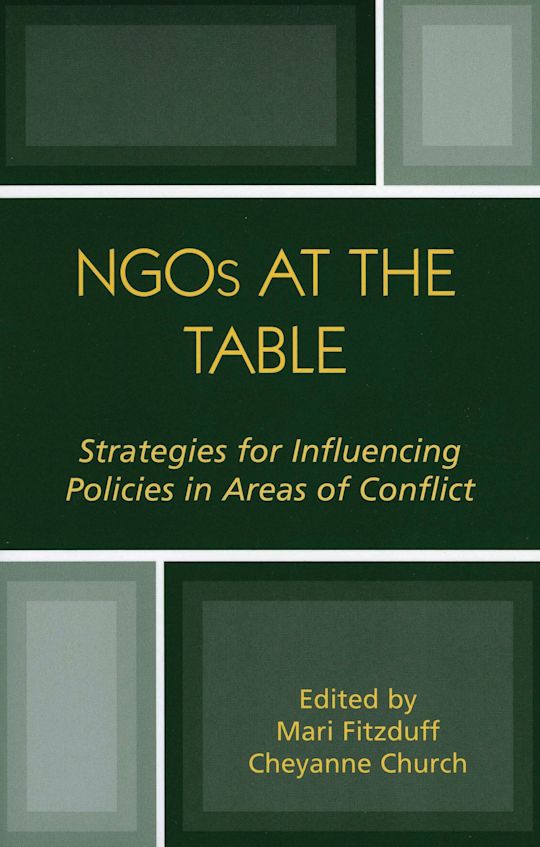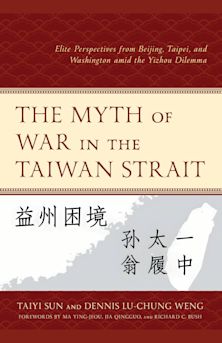NGOs at the Table
Strategies for Influencing Policy in Areas of Conflict
Mari Fitzduff (Anthology Editor) , Cheyanne Church (Anthology Editor) , Amr Abdalla (Contributor) , Ancil Adrian-Paul (Contributor) , Hizkias Assefa (Contributor) , Kevin Clements (Contributor) , Dogu Ergil (Contributor) , Mari Fitzduff (Contributor) , Nicola Johnston (Contributor) , Susan Collin Marks (Contributor) , Susan Allen Nan (Contributor) , Chris O'Donnell (Contributor) , Eugenia Piza Lopez (Contributor) , Marc Howard Ross (Contributor) , Sean Tait (Contributor) , John W. McDonald (Foreword)
NGOs at the Table
Strategies for Influencing Policy in Areas of Conflict
Mari Fitzduff (Anthology Editor) , Cheyanne Church (Anthology Editor) , Amr Abdalla (Contributor) , Ancil Adrian-Paul (Contributor) , Hizkias Assefa (Contributor) , Kevin Clements (Contributor) , Dogu Ergil (Contributor) , Mari Fitzduff (Contributor) , Nicola Johnston (Contributor) , Susan Collin Marks (Contributor) , Susan Allen Nan (Contributor) , Chris O'Donnell (Contributor) , Eugenia Piza Lopez (Contributor) , Marc Howard Ross (Contributor) , Sean Tait (Contributor) , John W. McDonald (Foreword)
You must sign in to add this item to your wishlist. Please sign in or create an account
Description
The number of NGO's working in the area of conflict has increased dramatically over the last few decades and they are fast becoming a vital component of both local and international responses to conflicts. As their influence rises, many seek to more effectively impact the policy making and program development of governments and intergovernmental organizations. But how can NGOs do this effectively without sacrificing their own independence and flexibility? NGOs at the Table explores such challenges by examining a number of NGOs, diverse in size, location, and financial means, that have successfully influenced both policy and program development in conflicts throughout the world. It explores why these organizations decided to embark upon a strategic campaign to influence the policy-making process, as well as outlines the issues addressed and the tactics used. It examines the constraints faced in trying to penetrate the governmental process and discusses how these obstacles were overcome. The book also includes analysis and reflections by a variety of experienced policy-makers and academics working in the field. A unique and much- needed resource for NGO's wishing to extend their own capacities in the field of policy-making, this book will prove valuable for any policy-maker wishing to take advantage of the unique capacities that NGOs contribute to the field of conflict prevention, management, and resolution.
Table of Contents
Chapter 2 1 Stepping Up to the Table: NGO Strategies for Influencing Policy on Conflict Issues
Chapter 3 2 Adding Complexity to Chaos: Policymaking in Conflict Situations
Chapter 4 3 The Challenges of Influencing Policy in Conflict Situations
Chapter 5 4 Track One and a Half Diplomacy: Searching for Political Agreement in the Caucasus
Chapter 6 5 Mainstreaming Partnership Approaches to Crisis: Northern Ireland
Chapter 7 6 Legitimizing the Role of Women in Peacebuilding at the United Nations: A Campaign Approach
Chapter 8 7 Impacting on Community Policing Policy: South Africa
Chapter 9 8 Multifaceted Programming: Influencing Policies in Burundi
Chapter 10 9 Reframing the Problem: An Approach to the Kurdish Question in Turkey
Chapter 11 10 Lessons Learned in Conflict-Related Policy Engagement
Product details
| Published | 02 Apr 2004 |
|---|---|
| Format | Ebook (Epub & Mobi) |
| Edition | 1st |
| Extent | 216 |
| ISBN | 9781461714811 |
| Imprint | Rowman & Littlefield Publishers |
| Publisher | Bloomsbury Publishing |
About the contributors
Reviews
-
The book is thus a welcome and perhaps belated acknowledgement of a significant change in the policy process in evidence since the early 1990s.
Ethnic Conflict Research Digest



































